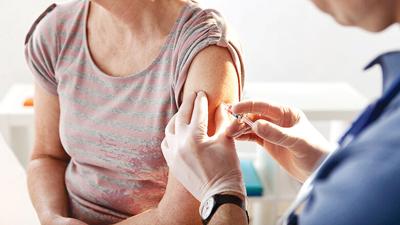This year marks the first respiratory season when vaccines are available for the three viruses responsible for most hospitalizations – flu, COVID and RSV – according to the Missouri Department of Health and Senior Services (DHSS). In addition to updated flu and COVID vaccines, RSV (respiratory syncytial virus) vaccines are now available to people 60 and older and pregnant women.
These three viruses usually are more prevalent in the fall and winter, according to the Centers for Disease Control and Prevention (CDC). Respiratory season officially begins Oct. 1.
Some seasons are more severe than others based on strains of the viruses circulating and our immunity to the viruses. The CDC expects this year will be similar to last year in terms of the hospitalizations from these viruses.
Flu
According to the CDC, the best way to protect against flu and its potentially serious complications is with a vaccine. Vaccines for the current flu season have been updated from last season’s to better match circulating viruses.
The CDC recommends getting vaccinated by the end of October. Immunity from vaccination fully sets in after about two weeks.
Brianne Zwiener, Jefferson County Health Department spokesperson, said health agencies and the Health Department encourage everyone 6 months and older to get their annual flu vaccine to help protect themselves, their families and the community.
“Flu vaccine is the best preventative action we have to fight the flu during respiratory season,” Zwiener said.
The CDC says flu vaccination is especially important for people 65 and older because they are at higher risk of developing serious flu complications that result in hospitalization or death. Older people should get a higher dose of adjuvanted flu vaccine, including Fluzone High-Dose Quadrivalent, Flublok Quadrivalent or Fluad Quadrivalent.
Dr. Steven J. Lawrence, a professor at the Washington University School of Medicine, said those vaccines are a little stronger and offer a little more protection than the regular vaccine.
He said if everyone 6 months and older would get the flu vaccine, it would prevent thousands of deaths. However, in a good year, only about half the population will get a flu shot.
“JCHD does offer the flu vaccine and we hope to start scheduling those soon,” Zwiener said. “We have received some shipments of the high-dose vaccine for older individuals. We are awaiting shipments of standard doses, which we usually receive the last week of September.
“Individuals can also get the flu vaccine at their primary provider’s office, at urgent care centers or at pharmacies.”
BJC will hold several free flu shot clinics. One will be held from 9 a.m. to 2 p.m. Saturday, Sept. 30, at the Siteman Cancer Center, 5225 Midamerica Plaza, in south St. Louis County. Another will be from 9 a.m. to 2 p.m. Saturday, Oct. 7, at Barnes-Jewish West County Hospital, 12634 Olive Blvd., in Creve Coeur. For more information and to schedule an appointment with BJC, visit bjc.org/flushots or call 314-362-9335.
Walk-in flu shots are available at most Mercy primary care clinics, pharmacies and urgent care centers.
COVID
Following approval from the Food and Drug Administration (FDA) and a meeting among the Advisory Committee on Immunization Practices, the CDC has recommended everyone 6 months and older get an updated COVID-19 vaccine to protect against potentially serious outcomes from the virus this fall and winter.
Lawrence said the new vaccine more closely matches the recent subvariants to boost protection against COVID. Those who have not received a COVID vaccine in the past three months should consider getting it, especially those at highest risk.
According to DHSS, vaccination remains the best protection against COVID-related hospitalization and death, especially for people older than 65 or those with weakened immune systems. Vaccination also reduces your chance of suffering the effects of Long COVID, which can develop during or following acute infection and last for an extended duration.
Lawrence said it’s OK to get the COVID and flu shots on the same day. He recommends getting the shots in different arms, though.
“It is proven to be safe and proven to still work,” he said.
The CDC says there is no recommended waiting period between getting a COVID vaccine and other vaccines. Experience with other vaccines has shown that the way our bodies develop protection, known as an immune response, and possible side effects after getting vaccinated are generally the same when given alone or with other vaccines.
DHSS says Missourians may still receive a COVID vaccine at no cost because most health insurance plans will cover COVID vaccines. People without health insurance or with health plans that do not cover the cost may get a free vaccine from local public health agencies, select Federally Qualified Health Centers and pharmacies (including Walgreens and CVS) participating in the CDC’s Bridge Access Program. Children eligible for the Vaccines for Children program also may receive the vaccine from a provider enrolled in that program.
Updated COVID-19 vaccines from Pfizer-BioNTech and Moderna are becoming available in the area. Walgreens and CVS were accepting appointments online for the new COVID vaccine.
Mercy Hospital Jefferson and Mercy Pharmacy hadn’t received the new vaccine as of Sept. 21. The Health Department also did not have the newest COVID vaccine.
For help in finding a COVID vaccine, visit covidvaccine.mo.gov/find.
RSV
According to the CDC, RSV is a common respiratory virus that usually causes mild, cold-like symptoms. However, infants, older adults and those with underlying medical conditions, chronic heart or lung disease or weakened immune systems are more likely to develop severe RSV.
Monoclonal antibody products have been available to protect infants and young children from severe RSV, but the FDA recently approved two RSV vaccines, Arexvy and Abrysvo, for people ages 60 years and older.
Lawrence said there is not much difference in the two new vaccines. He recommends that anyone 60 and older talk to their health care provider to see if they would benefit from getting one, adding that in most cases, the vaccine would be beneficial.
On Aug. 21, the FDA approved Abrysvo for expectant mothers at 32 to 36 weeks gestation to provide RSV protection to their infants from birth through 6 months.
Lawrence said the mothers’ vaccines provide protection to their newborns before they can get vaccinated themselves.
“RSV is a common cause of illness in children, and infants are among those at highest risk for severe disease, which can lead to hospitalization,” said Dr. Peter Marks, director of the FDA’s Center for Biologics Evaluation and Research. “This approval provides an option for health care providers and pregnant individuals to protect infants from this potentially life-threatening disease.”
Besides infants and older people, those more susceptible to severe illness and pneumonia include people with chronic heart and lung diseases or weakened or compromised immune systems, like those undergoing chemotherapy or transplant patients. Pregnant women and babies under the age of 1 are at more risk.
DHSS encourages people to minimize spreading viruses by staying home when sick, practicing good handwashing and seeking testing when ill to identify the infection for better protection of their family, coworkers and community.




